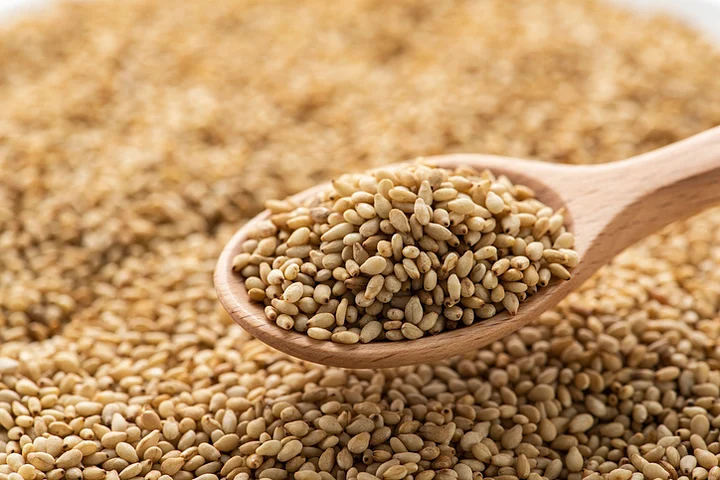Health Benefits of Sesame Seeds: Sesame seeds are tiny, oil-rich seeds that have been used in folk medicine for thousands of years. They are grown on the Sesamum indicum plant, which is cultivated in different parts of the world. The outer edible husk of the seeds gives them their golden-brown hue. Inside, the seeds are off-white, but they turn brown when roasted.
Sesame seeds have a wide range of potential health benefits. For example, they are believed to help in the prevention of heart disease, diabetes, and arthritis. To reap the health advantages of sesame seeds, you need to eat a small amount of them each day. Let us read about some of the top health benefits of sesame seeds below.
7 Amazing Health Benefits of Sesame Seeds
Following are some of the impressive health benefits of sesame seeds.
1. Blood Pressure Management: Sesame seeds are a natural ally for maintaining healthy blood pressure levels. Packed with magnesium, lignans, Vitamin E, and other antioxidants, they work synergistically to prevent plaque buildup in arteries, promoting overall cardiovascular health.
2. Lowers Cholesterol: Sesame seeds contain lignans and phytosterols, plant compounds that actively lower cholesterol levels. These substances, along with other components in sesame seeds, have been shown to reduce the risk of certain cancers and enhance immune function. Notably, sesame seeds boast the highest phytosterol content among commonly consumed nuts and seeds in the United States, with 400 to 413 milligrams per 100 grams.
3. Helps to Fight Infections: The potent antioxidants sesamin and sesamolin found in sesame seeds provide robust protection against infections. These compounds neutralize harmful bacteria, effectively combating staph infections, strep throat, and common skin fungi like athlete's foot.
4. Supports Oral Health: Sesame seeds go beyond oral hygiene - they actively fight the bacteria that cause plaque buildup on teeth. Oil pulling, an ancient practice involving swishing sesame oil in the mouth, has been proven to enhance oral health when performed regularly and correctly.
5. Rich in Fiber: Sesame seeds are a nutritional powerhouse, delivering 3.5 grams of fiber in just three tablespoons (30 grams). This represents a significant 12 percent of the Reference Daily Intake (RDI) for fiber. Considering the average fiber intake in the United States falls short of the recommended levels, incorporating sesame seeds into your diet can help boost your fiber intake. Fiber plays a vital role in digestive health and may reduce the risk of various chronic conditions, including heart disease, certain cancers, obesity, and type 2 diabetes.
6. Anti-cancer Properties: Sesame seeds have been found to possess some anti-cancer properties. Sesamol present in sesame seeds acts as an antioxidant, anti-mutagenic, and anti-inflammatory. This natural phenolic compound has also chemo preventive properties. Due to its antioxidant property, Sesamol lowers lipid peroxidation by preventing the formation of fee radicals. Several research studies have highlighted the possible anti-cancer effects of sesame seeds, but further research is certainly needed.
7. Boosts Immune System: Sesame seeds are a good source of several nutrients that are essential to maintain a healthy and resilient immune system. These nutrients include zinc, selenium, copper, iron, Vitamin B6, and Vitamin E. Zinc is essential for the development and activation of certain white blood cells that recognize and attack invading microbes. Zinc deficiency in the body may affect the immune system activity, leading to increased susceptibility to infections. Sesame seeds supply about 20 percent of the recommended daily intake of zinc, making them a good source of this essential nutrient for those who are at an increased risk of deficiency.
(Disclaimer: Parts of this article were generated by AI and published after the content was editorially modified and verified by a human based on their own judgement and expertise. The Quint does not publish AI-generated content without direct human involvement and oversight).
(At The Quint, we question everything. Play an active role in shaping our journalism by becoming a member today.)
